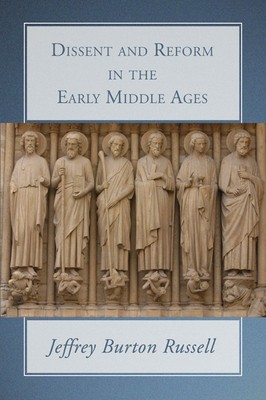
- We will send in 10–14 business days.
- Author: Jeffrey Burton Russell
- Publisher: Wipf & Stock Publishers
- ISBN-10: 1597520861
- ISBN-13: 9781597520867
- Format: 14.2 x 21.6 x 2.1 cm, softcover
- Language: English
- SAVE -10% with code: EXTRA
Dissent and Reform in the Early Middle Ages (e-book) (used book) | bookbook.eu
Reviews
Description
From the Introduction: The conceptual boundaries of this study...include all varieties of religious dissent, nonconformity, and tension. The chronological limits are from about 700 to about 1150. Before the eighth century dissent was, in the tradition of the heresy of the early Church, theological and priestly. After the middle of the twelfth century the increasing influence of Eastern dualism under the name of Catharism changed the whole emphasis and style of medieval dissent. Between 700 and the mid-twelfth century, however, dissent was typically medieval in its moral and popular emphasis without yet being adulterated by currents from the East. In this period it was closely connected with the growing intensity and diversification of movements of moral and intellectual reform. With these movements and as part of them, dissent was one of the elements shaping medieval civilization. Jeffrey Burton Russell is Professor Emeritus of History at the University of California, Santa Barbara. Besides UCSB, he has taught History and Religious Studies at Berkeley, Riverside, Harvard, New Mexico, and Notre Dame. He has published seventeen books and many articles, most of them in his special field, history of theology. His other books include a five-volume history of the concept of the Devil published by Cornell University Press between 1977 and 1988, 'Inventing the Flat Earth' (1991), and 'A History of Heaven: The Singing Silence' (1997).
EXTRA 10 % discount with code: EXTRA
The promotion ends in 20d.16:27:20
The discount code is valid when purchasing from 10 €. Discounts do not stack.
- Author: Jeffrey Burton Russell
- Publisher: Wipf & Stock Publishers
- ISBN-10: 1597520861
- ISBN-13: 9781597520867
- Format: 14.2 x 21.6 x 2.1 cm, softcover
- Language: English English
From the Introduction: The conceptual boundaries of this study...include all varieties of religious dissent, nonconformity, and tension. The chronological limits are from about 700 to about 1150. Before the eighth century dissent was, in the tradition of the heresy of the early Church, theological and priestly. After the middle of the twelfth century the increasing influence of Eastern dualism under the name of Catharism changed the whole emphasis and style of medieval dissent. Between 700 and the mid-twelfth century, however, dissent was typically medieval in its moral and popular emphasis without yet being adulterated by currents from the East. In this period it was closely connected with the growing intensity and diversification of movements of moral and intellectual reform. With these movements and as part of them, dissent was one of the elements shaping medieval civilization. Jeffrey Burton Russell is Professor Emeritus of History at the University of California, Santa Barbara. Besides UCSB, he has taught History and Religious Studies at Berkeley, Riverside, Harvard, New Mexico, and Notre Dame. He has published seventeen books and many articles, most of them in his special field, history of theology. His other books include a five-volume history of the concept of the Devil published by Cornell University Press between 1977 and 1988, 'Inventing the Flat Earth' (1991), and 'A History of Heaven: The Singing Silence' (1997).


Reviews